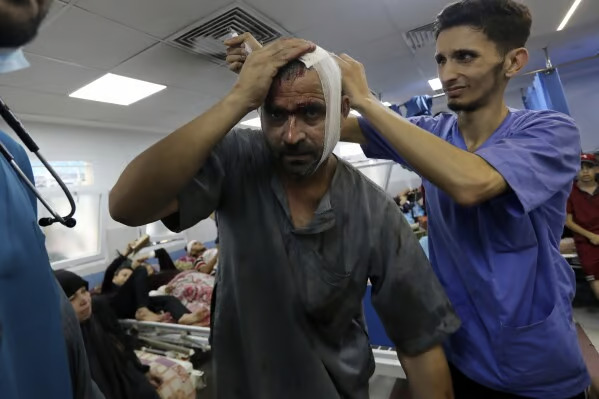Near Gaza’s embattled Al-Shifa hospital, three nuns of Mother Teresa’s Missionaries of Charity are current struggling to support roughly 60 trapped people, including the elderly and disabled, with only intermittent contact with the outside world, according to an India-based priest who recently spoke with one of the sisters.
Fighting around the hospital has been especially fierce, as Israel accuses Hamas of running a command center in tunnels under the hospital, and of using doctors and patients as human shields. On Sunday, roughly 30 newborn children were evacuated from the hospital by medics from the Palestinian Red Crescent and the World Health Organization and allowed to cross into Egypt for care.
Recently Israel has been escorting journalists into the tunnels to bolster its case for their use by Hamas, and has also released video showing what it claims are Hamas militants forcing Israeli hostages into those tunnels.
Hamas has denied building tunnels under medical facilities.
The intense combat in the area has affected not only the nearby Holy Family Catholic Church, the lone Catholic parish in Gaza, but also the small Missionaries of Charity convent.
“In the convent, there are 3 sisters and 60 residents, [including] handicapped and mentally challenged children and old people bedridden with bedsores, who have no food, water, medicine, electricity, or gas,” said Father Francis Xavier Rayappangari, commissary of the Holy Land in India.
“Communication from outside is cut off, and the entire area is surrounded by the [Israeli] army,” he told Crux. “Once in a while, their landline telephone gets connected.”
Rayappangari said that recently he was able to speak briefly to a Missionary of Charity sister in Jerusalem, who in turn had spoken to the nuns in the Gaza convent, and who described the realities they face.
“Sometime some generous and courageous people bring something for them to eat,” Rayappangari quoted the sister as saying.
“Whatever they receive from outside, the sisters first serve the residents. If there is anything left, they eat. Sometimes they get just one meal a day … most of the time it is just one meal a day,” he said.
Rayappangari said food supplies are becoming an steadily greater challenge.
“One day they had just one loaf of bread shared among the three,” he said. “The other day it was just an orange, and the three sisters shared it among them.”
Rayappangari also said witnessing the horrors of war has become a daily occurrence not only at the convent but also the nearby parish, where an estimated 700 people have sought refuge from the shelling and combat.
“One lady wanted to go home in order to take a bath,” Rayappangari said, recounting a story he heard from the sisters. “As she stepped out of the campus, she was shot and died bleeding.”
“May the Prince of Peace give peace to this land,” he said.
Hamas, which is banned as a terrorist organization in the United States and Europe, launched the surprise attack Oct. 7 in which Israel says 1,200 people were killed and around 240 others kidnapped. More than 10 weeks of Israeli airstrikes and ground assault following the attack have killed more than 13,000 Palestinians and displaced more than 1.6 million in the Gaza Strip, according to health officials in the besieged enclave.
One of the main narratives of the conflict so far has been Israel’s attacks on hospitals, ostensibly targeting militants but in which patients and medical staff have also been killed. Israel claims those attacks are necessary to eradicate terrorist infrastructure, while critics denounce them as a war crime.
By Nirmala Carvalho | Vaticannews






